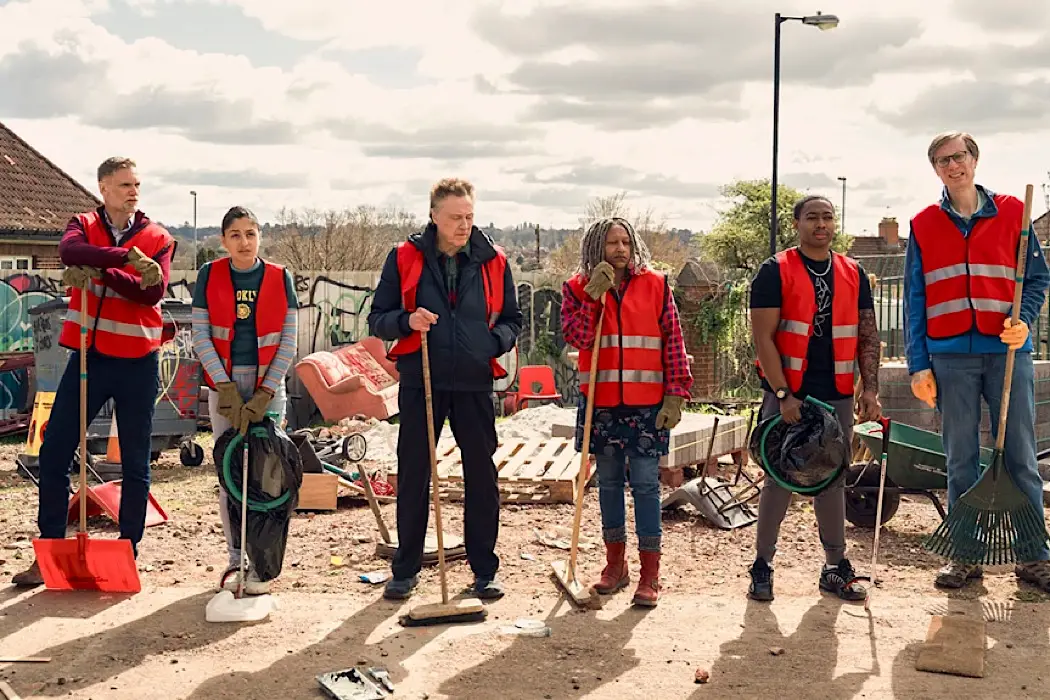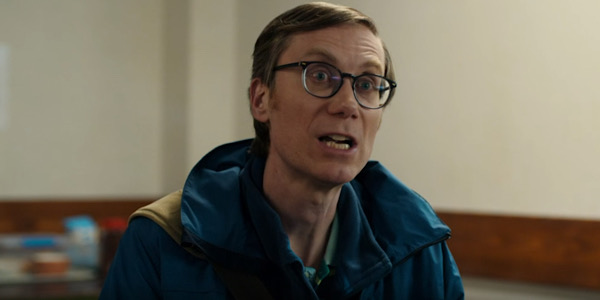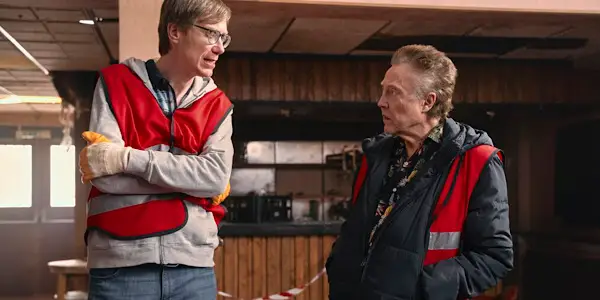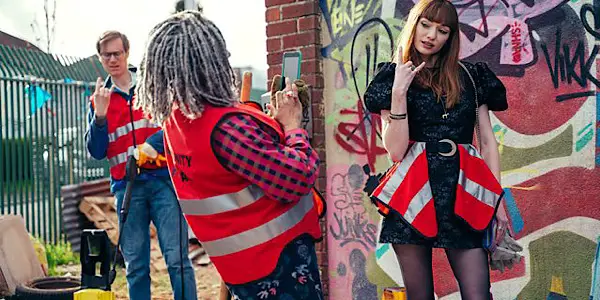Interview With Stephan Merchant Co-Creator/Co-Writer and Star Of THE OUTLAWS

Kristy Strouse is the Owner/Editor in Chief of Film Inquiry,…
Stephen Merchant is no newbie to comedy, he’s been behind and in front of the camera for many years, bringing his unique sense of humor to the film and television world. With his newest, The Outlaws, the Amazon series follows a group of people who get to know each other through their mandated community service work. The story is ripe with an opportunity to intersect comedy, crime, drama, and thriller.
I was able to speak with the co-writer/creator and star about the origin of this show, his collaboration, the casting of Christoper Walken, the unexpected power of The Office, and much more!
This interview has been edited for clarity.
This is Kristy Strouse for Film Inquiry: Thank you for taking the time to talk to me today. I’m really enjoying the show, congratulations!
Stephen Merchant: Thank you!
So, to start, where did this idea for The Outlaws first come from?
Stephen Merchant: Well, my parents when I was growing up, I used to be involved with people doing community service. They weren’t criminals themselves, just to make that clear to your readers. I mean, they did a couple of bank heists, but they were minor.
Just some little ones.
Stephen Merchant: And they would tell me about the people that sort of came through the doors. And I always thought it was interesting, even as a teenager because it’s such an unlikely mix of people that you’d have. I remember, there was an old guy that used to steal fruit and vegetables from people’s gardens. And he would come back year after year. And my mother realized over time, that he was just sort of lonely. And he sort of enjoyed, like the social aspect of community service. I mean, I thought he could have joined, you know, a bingo society or an amateur dramatics club.
But anyway, he thought, you know, jail time or the equivalent of jail time was better. And I just thought it was an interesting kind of backdrop for some, because it’s such an unusual collection of people, and it’s sort of like a prison, but it’s not, you know, because you’re still out in the community, out in the world. But you can have some of the sorts of fun that prison dynamic of unlikely bedfellows, you know, so anyway, that idea was floating around for years. And then I went to Elgin with it and said, you know, do you think there’s any mileage in this? And then here we go.
I do love that. Because I think the community aspects also allows it to be, different ages, genders. As opposed to a prison.
Stephen Merchant: Yes, prison would be a lot more restricted. And generally, I think you tend to think of prisons as a lot more… kind of tough, tough guys. Right. Whereas what I liked about this was it was such a kind of suburban group of people. You know, that they weren’t kind of glamorous. They were just sort of relatively ordinary, except for their mistakes.
Yeah, I love there’s a part where one character is talking about the different types of people that are there. And when she gets to your character she’s just like… “I don’t know what he is.” [laughs]
Stephen Merchant: That’s right. Well, that’s just me! Always happy to be the butt of a joke, particularly if I’m one of the writers.
Speaking of that, did you write that character with you in mind?
Stephen Merchant: Initially, I was thinking, I thought that the role of John might have been a bit more interesting for me, a bit more of a departure and a bit more of a challenge. But Darren [Boyd] was so good in the auditions, that it just was a no-brainer to have him play that character. And also, I think, from a long time ago, the sort of great characters floating around and it just seemed odd to me, like, why am I getting someone else to play a kind of awkward nerdy guy? It just seems perverse to get someone in to play that role. If I was there anyway.
That makes sense.

Stephen Merchant: I’m aware. I’ve typecast myself.
I read that you are going to be playing a serial killer in something upcoming! So you get to depart there!
Stephen Merchant: That was something we actually filmed before this. It was delayed because there were police, and there was an inquest going on. So they couldn’t release the program. But yes, that’s a very sort of sincere drama in which I play a real-life serial killer called Stephen Port who killed a number of young men in the UK a couple of years back. And that is on Britbox. Is that a thing in the US? I think it may be on Britbox or somewhere else. That was a very, very big departure for me as an actor.
How was it collaborating with Elgin James? You frequently collaborate on projects with others.
Stephen Merchant: Well, I sort of, I didn’t know anything about Elgin, really, before I met him. And we met up in a kind of hipster cafe in Los Angeles. And, you know, he comes from a very different background to me and has a very different life experience. But I’d seen his Sundance film that he’d made, and I liked that enormously. So, we met and just hit it off. And I think with all the collaborators I’ve worked with, that you spend as much time talking about the things you hate as the things you like, and that becomes the sort of bonding material really, in terms of what your tastes are, but also what your worldview is, and what your sense of humor is.
And despite our very different life stories, Elgin and I kind of hit it off on those levels. And so it became a really, really fun collaboration and a really enjoyable one. And, he often, I think, thought that, because he was working with me, you know, he had to write punch lines to things and I was like, Oh, don’t worry about it. If there’s no punch line then don’t put one in. We’re trying to do something that sort of, can be funny when it wants to be, dramatic when it needs to be, and not sort of tie ourselves to any, any particular style.
Yeah, and that’s something I really liked about it. You know, it starts off almost like, a sitcom, comedic. And then it kind of segues into more dramatic as well as he did some, like thriller elements, crime, etc. Was that the idea from the beginning? Or did it kind of evolve?
Stephen Merchant: Well, I was wanting to do a genre thing, because I love thrillers. And whether it’s TV or movie thrillers, I’ve always liked them. And that’s my go-to, you know, as something to watch, so I always want to do that. And again, I like the idea that, because they’re sort of low-level criminals, and that seemed like a sort of backdoor entrance into our crime story.
But also, a lot of the things which I’ve always really enjoyed have that sort of mix of tones. I mean, I think, you know, if you think of Hitchc*ck, there’s a lot of suspense, but there’s also a great deal of humor in his films. And I think Billy Wilder is a big hero of mine. He is able to do that, and I think a lot of those films, always kind of had this kind of sharp sense of humor. Whether it’s sort of Bogart as Philip Marlowe or whoever it might be. So it was like that as a sort of touchstone. And they’re not often that successful, but when they are like Midnight Run, you know, when they’re good, they’re really good. Yeah, and it’s quite a hard tone to get right. But also I think there are episodes of The Sopranos that are really funny. And clearly more recently, Succession, where they mix in humor, and I think sometimes we just, we just able to push it a little further to towards kind of some physicality or whatever, but hopefully, we never kind of stray beyond the realms of reality, you know, it sort of stays within a believable universe.
Yeah, absolutely! You do that well. So, what was the process like getting Christopher Walken in the cast?
Stephen Merchant: Well, you know, on the surface, it looks like it’s one of those sort of bits of stunt casting, you know, where Amazon said, “You better have a big movie star!” But actually, we always talked about the idea of this, of this kind of older American, or they could have been French, Gerard Deperddai. You could have enjoyed that. But like a kind of character that was like a man who fell to earth like, Why is he here? Why is he in this town? And on the surface seems a bit exotic. And then you would discover, he’s just as sort of small and petty as the rest of these characters.
And you know, there aren’t many people of that vintage with that sort of caliber, aside from people like Walken and he was at the top of the list. And so, yeah, I went up to his house in Connecticut to see him and he cooked me an omelet, which was very nice of him. We sat and we talked for three and a half hours about Bristol, about the show, the tone and about the character. He knew people like that, that he’d grown up with. And we seemed to hit it off early. And the next thing I knew he was in Bristol.
So yeah, and I think it was fair with those people is that there’s so established, you often hear those stories of sort of Odoo, one taker that want to be back to the hotel by three, right? But he was sort of really still very gung ho about doing loads of takes and giving you different stuff for the editing room and doing a funnier version or a darker version or whatever. And playing around. It was still I don’t know. I mean, it seems to me like he was still enjoying acting as much as he ever had.

And that’s lovely to hear. And how were his omelet cooking skills?
Stephen Merchant: Very fluffy. Excellent, excellent work, asked for seconds, so he’s clearly doing something right.
Well, if he ever stops acting, he knows that he can open an omelet shop.
Stephen Merchant: That’s right.
So, you obviously wear a lot of hats. Is there one that’s your favorite as far as acting, writing, or directing?
Stephen Merchant: Well, I studied film at university. And what I think I gravitated to initially off the back of that was the writing. Because the writing is, I think, for me the most stimulating of all of those different hats. It’s sort of nutritious, it’s like a good dinner, you know, it’s meaty, it’s fun, it’s filling, and it’s challenging. Most of the other things I do, like directing are enjoyable, but it is also very stressful. And you never have enough time and or get enough money. You are always fighting the elements, and it’s just very tiring, and hard. Acting can sometimes be challenging like that too, but there are often lots of waiting around, and can be a little bit dull. So, I like the writing. And then the other thing I like is the editing, I really enjoy the editing! I think that’s always another form of rewriting. I think of if I had to pick a lane, you know, if Chris was doing his omelet shop, then I think my choice would probably be writing, writing or editing.
One Writing Omelet, and maybe half an editing omelet.
Stephen Merchant: Yes!
Now, we talked earlier about you doing things you haven’t done before. Is there any genre or anything you’d really love to do or an area you’d like to explore?
Stephen Merchant: Well, that’s the thing really, is that I’m a sort of such a fan of so many kinds of stuff. I began in comedy, and I sort of built my reputation on that, But, it’s not the thing I watched the most, not my got-to. I’d like to direct an action film, I’d like to direct a thriller, I’d like to direct a kind of indie art house thing and a kind of Albert Brooks smaller romantic comedy-drama. Or James L Brooks. He has such a kind of broad talent, that talent is a broad term, that’s not for me to say a bold taste, I should say, again, like Billy Wilder, who had such a varied career, right.
As a writer and director, but also as an actor, I like to do a bit of everything. So, I sometimes feel like I’m a bit of a sort of jack of all trades, master of none, like I haven’t picked a lane here. This kind of gave me an opportunity to, just to sort of dip my toe in that water, right with a thriller. In the second episode, we had that sort of home invasion sequence that was sort of something new for me. And then we got that kind of foot in the last episode, and they’re my sort of homage is to, you know, Halloween, Michael Myers walking, or that foot chasing Point Break. I mean, there are all kinds of influences that we steal from, like anybody else. I like to do a bit of it al, all of it, really, but it’s just finding the time. Everything takes time to write and to get off the ground. And when you try and do a bit of all of it, like me, you know, it sort of can only do one thing at a time.

Sounds like you’re pretty busy!
Stephen Merchant: Well, it’s funny that during lockdown, I wrote a kind of, I suppose you call it like a kind of psychological thriller. I had this idea for and I wrote that just for fun. I enjoy the process of it, and the puzzle of it, but I don’t know if it’ll ever get made, it’ll just probably be in a box when I die, that just find all these unpublished unfinished scripts, you know?
I hope not! I want to see your psychological thriller. So I hope it gets made!
Stephen Merchant: Thanks!
I have to ask as a fan, because the Office, both in the UK and US has been so massive. Did you ever think it was going to be as beloved as it was when you started?
Stephen Merchant: Honestly, when you’re making it, the only thing I think we felt when we did our version in the UK was that our dream was always that it would be a million people’s favorite thing. That was our ambition. Because we’re very proud of it and we felt we’d hit on something that felt kind of truthful and fresh with very good performers, and I think we’re very happy with it. But I didn’t think we thought it was going to have mass appeal, I think we just sort of felt obvious could be like a cult favorite. You know?
That sort of bunch of people really like. And initially, that seemed to be its fate. And then it just sort of seemed to take on. In the UK, it took all that kind of momentum and started to win awards. And then it got sort of rerun, and people picked it up. Then by the time we did the Christmas specials, it was very well known. I think it helps that every single newspaper article in the UK about office life would always use a still from the show. I think it felt it became sort of like self-fulfilling, you know, it fed back on itself. Then with the American version, I think, as somewhat of a historian of film and TV, I always thought there are many successful transfers from the UK to America, that there’s been a few, but there aren’t many. And one of the mistakes seems to be when the British people try to do the American version. They end up just trying to replicate the British version, but they don’t quite know the DNA of America, the subtleties of America. So, my only kind of claim to fame in terms of the American version is saying to Ricky [Gervais], I don’t think we should do this. I think we should get a talented American to do it, which we did. I think that is a large testament to Greg and to the success. But certainly where it went, on Netflix and other outlets is just insane. I mean, it’s… you can’t imagine that that would ever happen.
And did you expect the kind of success and reaction with this, this series Outlaws?
Stephen Merchant: The thing that I was excited by was when it was shown in the UK before it was shown in the States. And the thing that I liked, which I had not expected, because I haven’t really done anything where I paid as much attention to social media, or at least in terms of my own social media. Well, the thing I liked was that people, which was unexpected, was that people were very much engaging with the characters. They seemed like they were investing in them. And that’s, and I think, for some reason, although you always want that to be the case, that wasn’t sort of what we were kind of thinking about. Even if you don’t like the character, some of the characters, hopefully, there’s enough going on that you’re sort of stay with it. That you will actually engage with the characters and if there are characters that they perhaps don’t like or wouldn’t politically agree with or whatever. They were invested in them. And finding that empathy was really pleasing. That’s what I was satisfied the most with.
Of course! And I think that’s obviously a goal.
Stephen Merchant: Yeah, exactly. So I’m really pleased about that. And the fact we’ve already been able to do a second series, we’ve already shot that.
I was going to ask!
Stephen Merchant: Yeah, because we started shooting originally on that first COVID outbreak. And then we’ve got 10 days in and had to shut down. And I rather smartly again, and now I sound like I can, like I’m foreseeing a great future. Like I foresaw the American office success. [laughs] But, I thought I don’t think this COVID is going away anytime soon, I get a sense that it’s not gonna be over very quickly. So I said the BBC, can I just write a second series? And when we come back, we can do two back-to-back? And they said yes! Which it turns out is an incredibly stupid thing to do. Under COVID, to try and make 12 hours of TV with no break, but at least it meant that we sort of got to two to two series in the can, which is really pleasing. Because it felt like we don’t have to start up again and try and continue, we have a nice kind of arc of episodes. So ready to go.
Absolutely. Well, we look forward to Season Two and thank you again for talking to me. Best of luck with everything in the future as well!
Stephen Merchant: I appreciate it. Thanks so much!
Season 1 of The Outlaws is currently streaming on Amazon Prime
Film Inquiry would like to thank Stephen Merchant for taking the time to speak with us.
Does content like this matter to you?
Become a Member and support film journalism. Unlock access to all of Film Inquiry`s great articles. Join a community of like-minded readers who are passionate about cinema - get access to our private members Network, give back to independent filmmakers, and more.
Kristy Strouse is the Owner/Editor in Chief of Film Inquiry, writer, podcaster, and all around film and TV fanatic. She's also VP of Genomic Operations at Katch Data and is a member of The Online Association of Female Film Critics and The Hollywood Creative Alliance. She also has a horror website: Wonderfully Weird & Horrifying.













